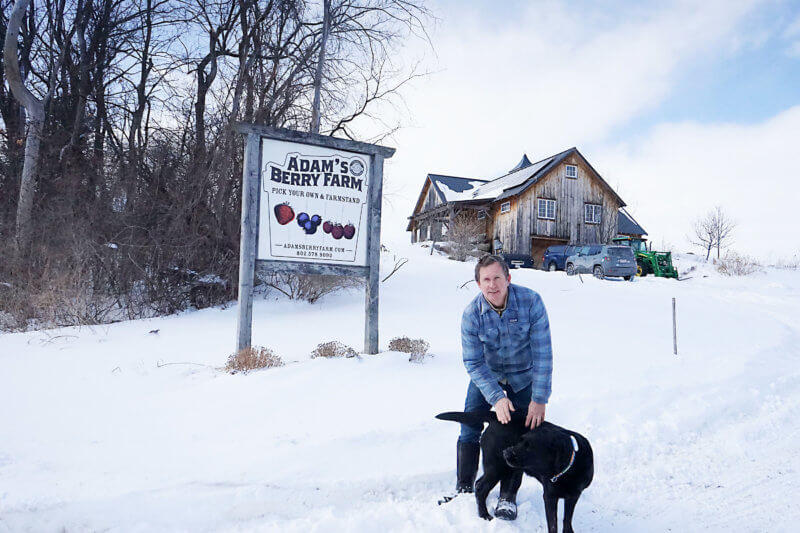Adam’s Berry Farm: Vermont farm life in the winter
With berry season around the corner, the work of Adam’s Berry Farm extends past the harvest season and through these winter months.
At Adam’s Berry Farm, the official harvest season for berries usually begins in June and runs through November, starting with June strawberries, and by late June, raspberries begin blooming. By the time the Vermont winter approaches, the farm focuses on other aspects of care.

“Really, the work is year-round,” said Adam Hausmann, the owner and manager of Adam’s Berry Farm, located on Bingham Brook Road in east Charlotte. “I always say that it’s kind of a myth that we only work from June to October because of the harvest season.”
Hausmann operates the farm with his wife, Jessica Hausmann, and 15 or so employees during the busy harvest season who help to maintain the farmland, run produce stands and support visitors who come to pick berries. Adam’s Berry Farm is one of the largest wholesale suppliers of organic produce to restaurants and markets in the Charlotte area, and the business continues to distribute their berries in the winter months.
“We freeze our produce quite a bit, so I’m still working on those sales throughout the year. The summers, because of the perishability of our crop, are much more fast-paced and manic, due to the nature of what we grow. But we have year-round distribution of frozen berries to restaurants and local markets, and then different breweries around, as well,” Hausmann said.
In the winter, Adam’s Berry Farm also runs popsicle, sorbet, jam and strawberry-lemonade businesses. The colder months also offer a valuable time for pruning—removing overgrown or dead stems and branches.
“Pruning is the big thing,” Hausmann said, “where, especially being organic, it’s one of our major tools that we have to help combat disease cycles, break pests and promote airflow and penetration, and even just balance harvests. It really helps. There’s a lot of the work that you’re doing in the winters that shapes the upcoming season.”
Perennial plants such as berries are outside year-round, and are exposed to the various conditions of a changing environment. The Vermont winter months and accompanying snow levels offer a certain degree of insulation to the berries, acting as a protective layer to the soil to hold both heat and moisture into the root systems. This process is much different than that used by vegetable farmer, as vegetables are planted and maintained when it’s warm enough for them to be harvested.
Perennial farming, being more permanent and requiring a number of growth cycles before fruit is produced, requires farmers to constantly be looking forward as much as five years ahead. Maintaining the farm is a full-time job, even in the “off-season,” as Hausmann and his team are constantly doing research on new growing techniques and methods to care for the land as efficiently and effectively as possible.
“The more the farm plans and works in the winter months, the better the harvest season is,” Hausmann said.
The fluctuation of temperatures impacts farms greatly, especially as the world continues to face the effects of climate change on our changing agriculture. As a grower, Hausmann is constantly trying to figure out how to inflate his business as best as possible and create stability within the unknown.
“Supporting local farms year-round is simply the big thing, and recognizing that it’s not just the growing season, it’s the growing months, which is a year-round thing for most farms. Incorporating that into people’s buying habits and consumption patterns—it’s great,” said Hausmann.
“There is no comparison to summer berries and local berries versus what you’re getting now. The fruit that you get now looks beautiful, but it’s been bred to be shipped all over the country. It doesn’t have any flavor. It’s definitely a berry, but it’s certainly not the same thing,” Hausmann said. “And being aware of these differences is what makes Vermont unique, really supporting your neighbor. We don’t look like ‘anywhere USA.’ We don’t have tons of big-box-chains all over—local businesses and farms still thrive here.”
Community News Service works in a partnership with The Charlotte News and other local media outlets to provide opportunities to University of Vermont students.
